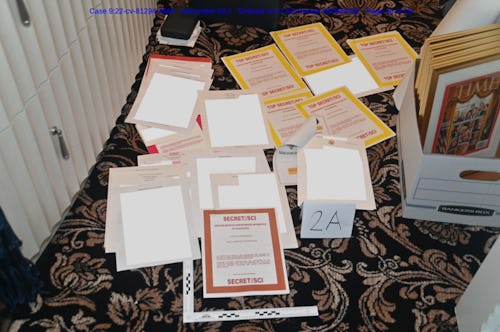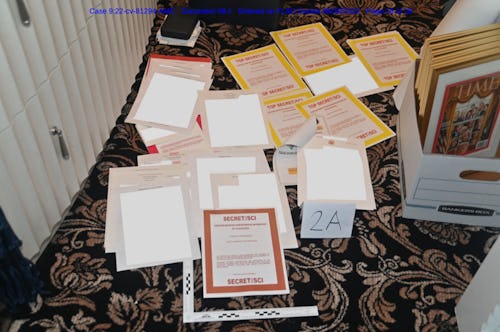
The odds that former President Donald Trump might soon face criminal charges stemming from the FBI’s early August search of his Mar-a-Lago estate increased dramatically this week, with a late night court filing from the Justice Department chock-full of incriminating evidence and, in a particularly striking attachment, photographic proof of just how egregious Trump’s conduct truly was.
The filing, submitted Tuesday night, was prompted by the former president’s demand that all items taken from his home be reviewed by a “special master” tasked with determining which documents were protected under attorney-client privilege. In response, the Justice Department explained to the court that “the government’s filter team has already completed its work of segregating any seized materials that are potentially subject to attorney-client privilege, and the government’s investigative team has already reviewed all of the remaining materials, including any that are potentially subject to claims of executive privilege.” What’s more, by requesting the special master in the first place, Trump himself opened the door to Tuesday’s filing, which afforded the DOJ new opportunity to showcase its increasingly strong cache of evidence against the former president beyond what had already been made public in the (heavily redacted) warrant and FBI affidavit behind the search.
And what a cache it is. As the DOJ filing shows, there is significant reason to suspect Trump and his team actively obstructed federal efforts to regain control of dozens of classified documents in his possession over the past few months — even after Trump’s team had sworn they’d returned everything they were supposed to.
In particular, the FBI claimed that it had “uncovered multiple sources of evidence indicating that the response to the May 11 grand jury subpoena was incomplete and that classified documents remained at the premises, notwithstanding the sworn certification made to the government on June 3.” What’s more, “three classified documents [...] were not located in boxes, but rather were located in the desks in the ‘45 Office,’” alongside several current and expired Trump passports, suggesting that he had handled — and mishandled — the materials himself.
All this looks bad for Trump, of course. But perhaps most damning of all is the following photo, stashed at the end of an 18-page appendix of supplemental documents, filed alongside the DOJ’s actual petition, which shows material clearly labeled as “top secret” found at Mar-a-Lago:

On his Truth Social platform, Trump responded to the filing by claiming that “I declassified” all the documents pictured — seemingly a confirmation that he did, in fact, have and know about all the papers, which per the DOJ photos were clearly stamped with various levels of top secret classification. He also accused the FBI of throwing the documents “haphazardly all over the floor (perhaps pretending it was me that did it!),” which, aside from being kind of funny, is fairly besides the point when the issue isn’t how they’re arranged on Trump’s personal office rug, but that they existed in proximity to his personal office rug in the first place.
Even Fox News’s Steve Doocy seemed incredulous about Trump’s defense, saying on Fox & Friends on Wednesday morning that Trump’s declaration of declassification was “news to the agencies that those documents belong to.”
All told, the DOJ claimed in its filing that the Aug. 8 search garnered more than 100 documents spread across more than a dozen boxes in Trump’s possession. The question now becomes what, if anything, the Justice Department plans to do about it.







